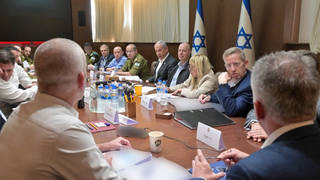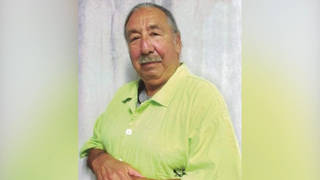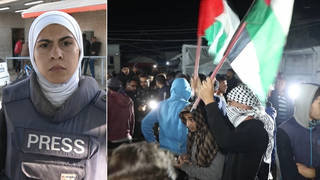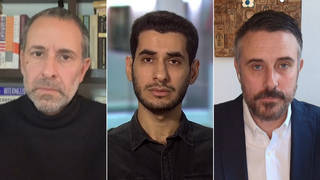
Related
Topics
Guests
- Jerome StarkeyThe Times of London correspondent in Afghanistan.
- Glenn Greenwaldconstitutional law attorney and political and legal blogger for Salon.com
Links
- US special forces 'tried to cover-up' botched Khataba raid in Afghanistan (Times of London)
- U.S.-led forces in Afghanistan are committing atrocities, lying, and getting away with it (Nieman Watchdog)
- Nato ‘covered up’ botched night raid in Afghanistan that killed five (Times of London)
- How Americans are propagandized about Afghanistan (Salon.com)
US-led forces have admitted for the first time to killing two pregnant Afghan women and a teenage girl during a nighttime raid in eastern Afghanistan on February 12th. NATO officials initially denied any involvement but were later forced to admit to the killings after the Times of London and other news outlets published accounts of survivors who described how the atrocity was carried out by US-led forces. We speak with Jerome Starkey, the Times of London correspondent in Afghanistan who broke the story. [includes rush transcript]
Transcript
AMY GOODMAN: We move now from a story on the US killing of civilians in Iraq to a story of the US killing of civilians in Afghanistan. US-led forces have admitted for the first time to killing two pregnant Afghan women and a teenage girl during a nighttime raid in eastern Afghanistan on February 12th.
NATO officials initially denied any involvement and claimed that the women had been tied up, gagged and killed hours before the raid. But officials were forced to admit to the killings after the Times of London and other news outlets published accounts of survivors who described how the atrocity was carried out by US-led forces.
One of the women killed was a pregnant mother of ten. Another was a pregnant mother of six. Afghan investigators told the Times of London US Special Forces soldiers tried to cover up the killings. US forces reportedly dug the bullets out of their victims’ bodies, then washed the wounds with alcohol, before lying to their superiors about what happened. Despite admitting to the killings, NATO officials continue to deny there was a cover-up and said that an ongoing legal investigation has found no evidence of inappropriate conduct.
Jerome Starkey is with us now from Kabul. He writes for the Times of London in Afghanistan. He broke the story. NATO singled out Starkey’s reporting in its denial of the cover-up, saying his claims were categorically false. Since then, the United Nations and the New York Times have corroborated his claims.
Jerome Starkey, tell us exactly how you discovered this story and what you found.
JEROME STARKEY: Well, my attention was first brought to this story by [inaudible] and extraordinary press release, which talked about the gruesome discovery of these three women tied up, gagged and killed. And that just sounded incredibly unusual to me, so although they immediately —- soon after the raid, we made contact with survivors, with relatives, and we made our way down to Gardez. And the family took us to the scene of the raid. And there they took us through what happened, piece by piece. We realized that [inaudible] -—
AMY GOODMAN: Jerome, I’m just going to interrupt for a sec — Jerome, I just want to interrupt for a second. If you’re on speakerphone, could you come off it? We’re just having a hard time understanding you.
JEROME STARKEY: No, no. I’m not on speakerphone.
AMY GOODMAN: Much better, much better.
JEROME STARKEY: Fine, is that any better?
AMY GOODMAN: It’s a little better, as close as you can to the phone.
JEROME STARKEY: My attention was first drawn to this story by [inaudible] press release, an extraordinary press release, which talked about the bodies, women’s bodies, being discovered tied up, gagged and killed. Just sounded so unusual, so we made contact with relatives, survivors, people who have been there, including the vice chancellor of Gardez University. And they invited us down to Gardez, and they said if we could get to Gardez, they would guarantee our protection, they would take us out to the scene. And that’s what they did.
And when we were there, we had a series of interviews with survivors or Afghan officials. Piece by piece, [inaudible] the story just unraveled. They said that several militants were killed. When we spoke to the family, when we spoke to local officials, we discovered three women and two men were killed. One of the men was a policeman, and the other one was a district prosecutor. They certainly weren’t militant. In further questioning, we discovered that in fact two of the women were pregnant, and all three of the women, despite military claims, were killed by the raiding.
AMY GOODMAN: Continue to talk right into the phone. How do you know that the soldiers, these Special Forces soldiers, pulled the bullets out of the bodies, presumably to cover up that, you know, they could be traced?
JEROME STARKEY: Well, the nature of these operations means that the only way we’ll really ever know exactly what happened on that night is if any of the soldiers involved ever get an attack of consciousness and choose to speak out, because the only people who really know what happened are either part of that force or they’re dead, because the room in which this is alleged to have happened, the only people who were alive at the time were the US Special Forces.
But the first time this claim of removing the bullets was made to me came from Haji Sharabuddin, the head of the family. He said to me that when we were in the room where four of the five people were killed, he is disgusted and appalled, and he was angry. And he said, “And on top of killing them, they dug out the bullets.” But it wasn’t — when he said it to me, it wasn’t as if he was alleging any sort of conspiracy; it was more that he was alleging a double violation of the bodies. When [inaudible] is so hard to verify, I almost didn’t write it down in my notebook. And I certainly didn’t report it in our initial coverage of the story, because it’s one of these things that’s just so hard to be sure about.
Nonetheless, many weeks later, when I spoke to the Afghan — or I spoke to officials involved, closely involved, in the Afghan investigation, and they had arrived at the scene within hours of the raid — compared to me, I arrived almost a month after it happened — and they confirmed these allegations. And they had drawn this conclusion on the basis of testimony of the survivors, on the basis of analysis of photographs of the victims’ bodies, particularly photographs and footage of the entry wound, where the bullets appear to have gone in, and because they said they had been unable to recover all of the bullets that they understood had been fired during the raid.
AMY GOODMAN: Jerome Starkey, the Pentagon calling your charges blatantly false? Jerome? Jerome? Well, let me —
JEROME STARKEY: Hello?
AMY GOODMAN: Hi, Jerome. Can you hear me?
JEROME STARKEY: I can hear you now.
AMY GOODMAN: OK. The Pentagon calling your charges blatantly false?
JEROME STARKEY: Well, indeed. And not only did they categorically deny my suggestion of a cover-up when we first made it last month, they maintain that whilst they now admit the three women they said they found killed, they in fact killed them, they insist still this wasn’t a cover-up, this was a cultural misunderstanding.
Their claim, which might seem increasingly ridiculous, is based on the fact that they say the force on the ground, which we understand included Afghans, who should, if they had seen these bodies, been very simple for them to identify that what the US forces thought were bindings and gags were just in fact normal ritual funeral preparations.
And one of the things to come out of the Afghan investigation, which is very unusual, is that we understand the Special Forces sealed off the compound from 4:00 a.m., when they first arrived, until 11:00 a.m. that morning. That’s more than seven hours. And Afghan officials said that just seven bullets were fired during the course of the attack. So it’s not exactly clear, still not clear, why the US Special Forces would have stayed on location for such a long time. And we understand it’s during that time, during some of that time, that some of the relatives began preparing their dead wives, daughters, brothers, fathers for burial.
AMY GOODMAN: Jerome Starkey, I want to thank you for being with us, Times of London correspondent in Kabul, Afghanistan, broke the story.
Glenn Greenwald, we just have thirty seconds, but the significance of this and how the press covered this attack?
GLENN GREENWALD: The similarities between this story and the Iraq one we just talked about are obvious. Here you have an incident that we know about only because of sheer luck and determination on the part of a single reporter, and again the military lying about what took place. And if you go back and read the accounts from CNN, the New York Times and others, all they do is mindlessly repeat what the Pentagon said without any questioning at all. That’s the way the media reports on these things. That’s how we, as a country, end up propagandized about it.
AMY GOODMAN: Well, Glenn Greenwald, I want to thank you for being with us, blogger for Salon.com. And again, thank you to Jerome Starkey, who is in Kabul, Afghanistan now.












Media Options